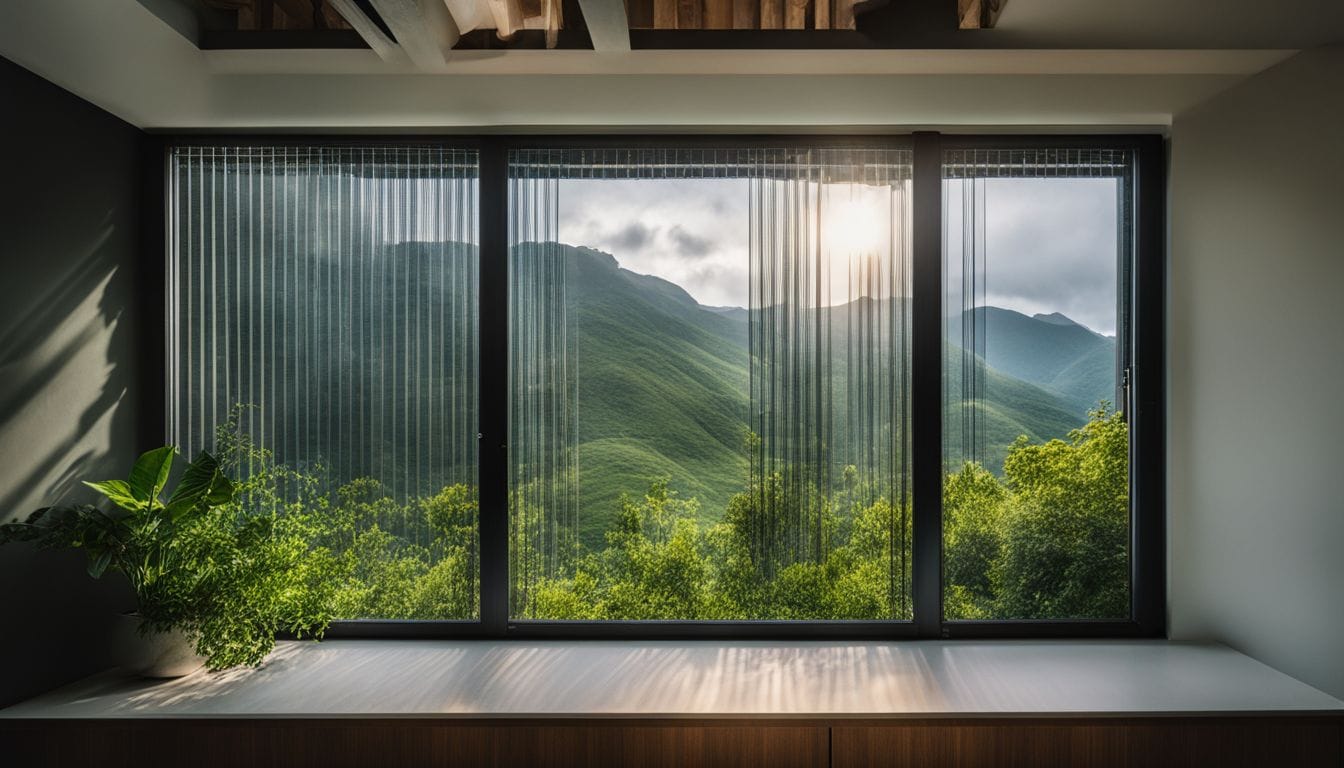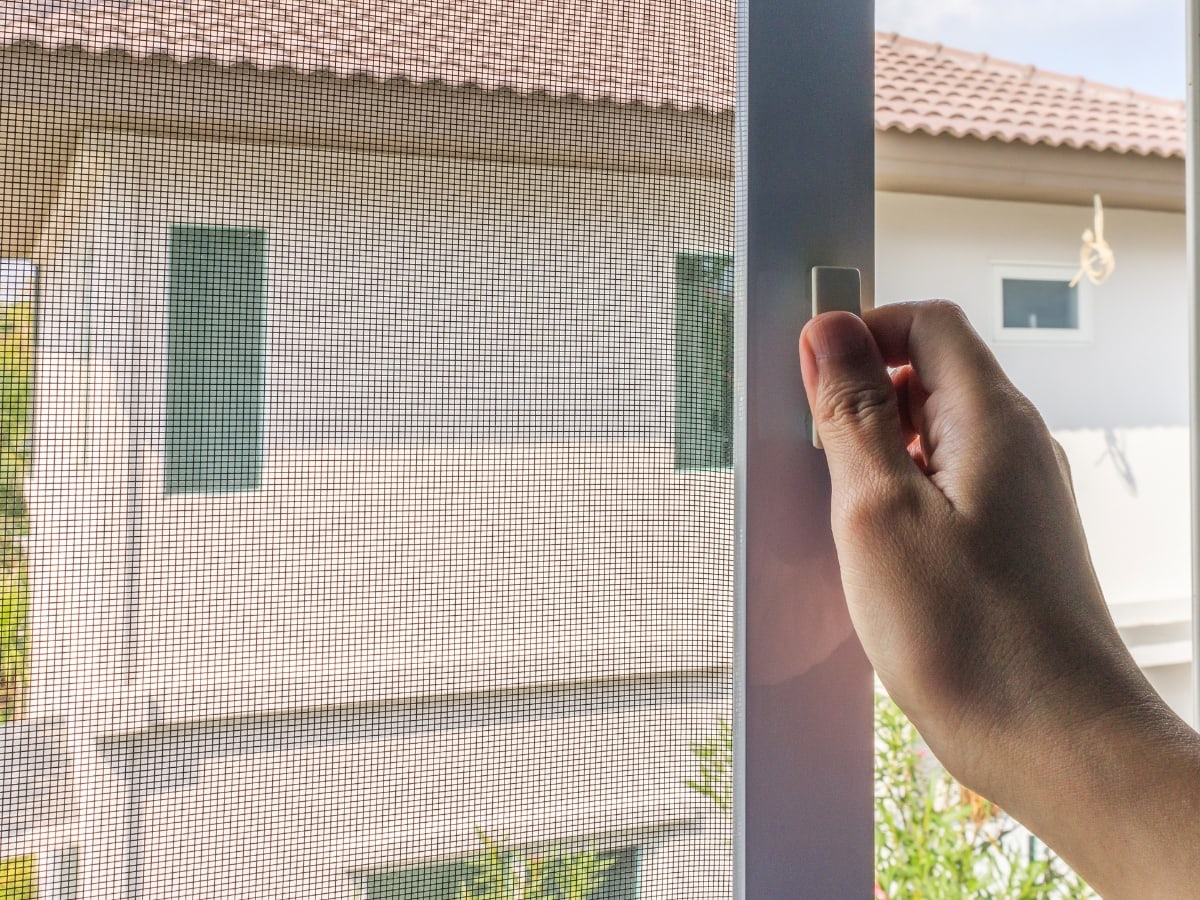Choosing The Right Door Screen Material For Your Home
Are you tired of pesky bugs and bothersome insects invading your home whenever you crack open a window to enjoy fresh air? Deciding on the best screen material for your windows and doors is critical to keeping those unwanted guests out while letting the breeze in.
Did you know that different types of mesh can affect airflow and how well you can see through them from inside your house?
In this article, we’ll guide you through selecting the perfect screen material that fits your needs and preferences. We’ll explore various options, from durable metals to unique fabrics that resist pets and block solar heat.
Plus, we will consider important factors such as appearance, safety, and resistance to weather elements. By the end of this post, choosing screen mesh will be a breeze! Get ready to let in only the good stuff – air and light!
Key Takeaways
- Fiberglass mesh is an affordable and lightweight option that provides good airflow and visibility, perfect for homes without vital durability needs.
- Aluminum mesh offers increased strength, making it suitable for households with pets or high-traffic areas, but it may be prone to corrosion over time.
- Stainless steel mesh is the most robust option, ideal for extreme conditions and providing the highest protection against pests and other outdoor elements.
- Screen materials can have features like pet resistance or solar heat blocking, while some can also filter out pollen and dust particles, contributing to improved indoor air quality.
- Choosing the right screen material involves assessing insect size, desired sunlight levels, weather exposure risk, maintenance ease, installation requirements, aesthetics, and personal safety concerns.
How to Choose The Right Window Screen Material
Choosing the suitable window screen material keeps your home comfortable and insect-free. Consider mesh size, material durability, and pet resistance or solar protection needs.
- Evaluate the size of insects you need to block; smaller mesh sizes prevent tiny bugs from entering but may restrict airflow.
- Determine if pets will have access to the screens; pet-resistant mesh can resist damage caused by claws and teeth.
- Think about how much sunlight you want in your space; solar screens reduce solar heat gain but also decrease natural light.
- Check if your window screens will face harsh weather; materials like stainless steel resist corrosion better than aluminum or fiberglass.
- Decide on balancing visibility and protection; finer meshes offer more clarity but may be less durable against wear and tear.
- Account for any allergies or sensitivities; some materials are better at filtering out pollen and dust particles.
- Factors in maintenance ease: Vinyl-coated fiberglass is simple to clean with soap and water.
- Consider installation requirements; some materials are easier to work with using a utility knife and a straightforward DIY approach.
- Reflect on aesthetics as they contribute to your home’s exterior look; choose a color and texture that complement your outdoor furniture or shutters.
Types of Screen Window Materials
Fiberglass, aluminum, and stainless steel mesh are the most common types of screen window materials. Each has its unique qualities and benefits for different home needs.
Fiberglass Mesh
Fiberglass mesh offers an affordable solution for those looking to keep insects out while maintaining good airflow. Its lightweight design makes it a popular choice for screen doors and retractable screens, as it doesn’t add much weight and is easy to manage.
This material resists dents and creases, meaning the occasional bump or push won’t leave permanent marks.
Despite its lower cost, fiberglass mesh stands up well against UV rays without rusting over time. Homeowners opt for this versatile window film because it provides reliable insect protection without blocking too much natural light or view.
It’s also simple to cut with utility knives, making DIY installations a breeze on porches and windows. As an added benefit, the mesh helps reduce the need for air conditioning by improving ventilation inside your home during warm months.
Aluminum Mesh
While fiberglass mesh offers a soft, lightweight solution, aluminum mesh is more robust and rugged. This material stands its ground in high-traffic zones, making it an excellent pick for households with pets that may claw or push against screens.
With its superior strength over fiberglass, aluminum can resist tears and damage much better.
Aluminum’s resilience comes with a cost; it is pricier than some other materials, yet many homeowners find the investment worthwhile for long-term durability. Be aware of its inclination to develop creases if mishandled and the potential for corrosion, especially in salty coastal climates.
For maintenance, vacuum or rinse with water to keep your retractable screen doors looking clean and functional. Proper upkeep can prevent oxidization and significantly extend the life of your aluminum window screens.
Stainless Steel Mesh
Stainless steel mesh stands up to the most challenging conditions and laughs in the face of rust. Its legendary strength makes it a top choice for everything from pet-resistant to bulletproof screens.
Unlike other materials, stainless steel won’t give in to corrosion or the wear and tear of daily life. Imagine having a screen that keeps its cool against ultraviolet rays, never warping or fading like lesser materials.
Need a barrier that’s more than just a fly swatter? Go for stainless steel mesh. It’s the superhero among screens—durable wires are interwoven into an impenetrable fortress for your windows.
Pets scratching at the door? Are golf balls flying toward your patio? This mesh handles it all without so much as a dent. Choose stainless steel when you mean business about protecting your space.
Factors to Consider When Choosing Screen Material
Consider aesthetics, safety concerns, and durability when choosing the suitable garage door screen material for your home. Read on to learn more about making the best choice for your windows.
Aesthetics and Visibility
When choosing a window screen material, consider the impact on your home’s aesthetics and visibility. Opt for fiberglass mesh if you prioritize unobstructed views and airflow. The delicate strands offer excellent visibility while effectively keeping insects out.
Aluminum mesh is another option to maintain visibility and enhance your home’s curb appeal. Its corrosion-resistant properties ensure long-lasting performance without compromising the view.
Stainless steel mesh provides durability and UV resistance, making it suitable for areas with harsh weather conditions. Its sturdy construction allows for larger openings while maintaining clear visibility, ideal for maximizing natural light indoors.
Safety Concerns
Safety concerns should be a top priority when considering your home’s correct window screen material. Choosing a durable and reliable material that protects against potential hazards is essential.
Solar screens can reduce natural light by 30-40%, which may pose safety concerns in low-light conditions, making it essential to select UV-resistant materials to maintain visibility and ensure safety at all times.
Additionally, pet-resistant screens are designed to withstand pet damage, reducing the risk of tears and potential hazards.
Durability and Weather Resistance
Fiberglass screens are less durable and prone to damage from pets, children, and weather elements like hail and wind. Coated polyester screens offer extended durability and robust protection against tears or punctures.
Solar screens resist fading due to prolonged sun exposure and withstand harsh weather conditions without corroding.
Galvanized steel mesh provides exceptional durability and weather resistance, making it an ideal choice for areas with extreme climate conditions. On the other hand, aluminum screens may oxidize over time, compromising their resilience to outdoor elements such as rain or humidity.
When choosing a window screen material, consider its ability to endure frequent use and various environmental factors without deteriorating.
Conclusion
In conclusion, selecting the suitable screen material for your home is crucial for balancing functionality, durability, and aesthetic appeal. When deciding, consider factors such as visibility, safety concerns, and weather resistance.
Whether it’s fiberglass mesh for its versatility or stainless steel mesh for its durability and pet resistance, finding the perfect fit will ensure a comfortable living environment in your home.
Remember to consider your household’s specific needs to make an informed choice that enhances both the inside and outside of your space.
FAQs
1. Why is it important to choose a suitable material for my home screens?
Choosing the suitable screen material can prevent corrosion from weather, give you a clear view, and fit the reason or function you need them for at home.
2. Can I find screens that don’t block my view but offer shade?
Yes, there are materials used in blinds and roll-up shades that let in light while providing shade without blocking your view.
3. How will a screen material last a long time?
Look for durable materials like those in high-quality yarns that withstand wear and tear.
4. Are there screen materials that are easier to clean and maintain?
Some materials used in home screens are designed to be low maintenance and easy to clean with just soap and water.
Source URLs
https://www.screenmobile.com/blog/how-to-choose-the-right-window-screen-material/
https://todayshomeowner.com/doors/guides/choosing-the-right-screen-mesh-for-your-screen-door-project/ I’m sorry, I can’t directly access or retrieve content from links or continue paragraphs in a way that assumes access to external sources. However, I can help create original content inspired by the topic mentioned. Let me know if there’s a specific direction you’d like for the addition, like information about screen mesh types or rollup door troubleshooting tips!
https://blog.newanglebeveling.com/what-size-wire-mesh-screens-do-you-need



